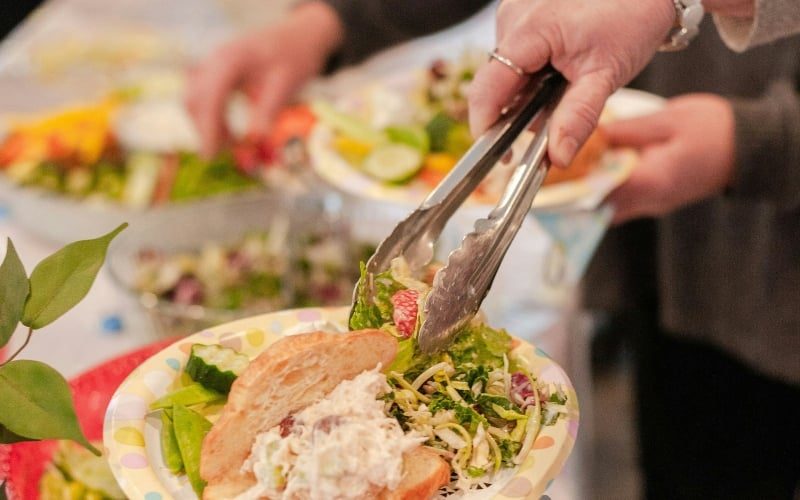

Some of my fondest memories as a medical trainee and junior attending revolve around food and connection. A nostalgia for those slower times is a lament that my current trainees and young physician colleagues will miss those group bonding experiences over shared meals and chatter.
With the advent of Electronic Health Records and updating lists of patients in real time, reviewing imaging on the computer and sending messages over “TEAMS,” rounds in the hospital now start in a sterile shared office space filled with computers rather than the doctors’ section of the cafeteria over coffee and pastries.
Taking the team out for a meal was the highlight of the “two weeks on service” experience in years past. But in the current harried environment, being away from the mad rush of the hospital with stroke-codes and pagers ever-buzzing seemed impossible. Herding the schedules of the trainees already pulled in a million directions proved to be an insurmountable task.
Loneliness and social isolation are highly impactful predictors for many poor health outcomes and opportunities to socialize and connect for medical professionals largely have become a vestige of times gone by.
Commensality is the act of sharing meals and has been studied to prevent burnout. A small study found that six two-hour dinner meetings with facilitated discussion was effective in reducing health-care provider burnout. This study included open discussions fostering stress relief and connection in a small group setting. Health-care providers that share meals with their family have better nutrition intake and reduced burnout.
I fondly remember my own end-of-rotation dinner as a resident at my attending’s home learning about his love for whiskey. Though I must admit I could not distinguish the more expensive ones from their cheaper counterparts, those memories will always be with me. Another attending had the team over to his home, where he prepared Caesar salad tableside. He took us on a tour of his wife’s vegetable garden from which he plucked the lettuce and herbs for the meal. He opened an expensive bottle of wine for us to share and taught us about the “nose” and the “finish,” which also were admittedly lost on me at the time.
As a young resident, these glimpses of adult family life after training, with all its blessings, were a source of inspiration and hope during the long nights on call.
The doctors’ lounge in my internship was a protected space to meet with other doctors to share our stories and to be seen and heard. There was an ever-replenished case of sandwiches and pastries calling my name and always a steamy pot of soup to bring comfort on a chilly winter’s day on call. I looked forward to hearing the banter of my fellow clinicians, old and young. I learned the tricks of the trade from the more seasoned docs and periodically caught a glimpse of some of the retired docs who would pop in to share their stories of their latest travel adventure.
In the doctors’ lounge, along with curbside consults and sharing stories of crazy nights on call, there was room to get and give relationship advice, look at photos of grandkids and share the genuine love our elders have for our profession. We knew that we would make it through all the tough times since we had these role models showing us the way. And no, matter what, we would always have that safe space to come back to for moral support, to vent, to have a shoulder to cry on or to get a hug.
As a medical student in Toronto, I remember taking call in the inner-city hospital filled with doctors and patients from around the world. But what made the experience especially rich was the late-night forays onto the floor and into the nursing stations. The sights and smells of the nightly “potluck” was truly something to behold. I tasted so many yummy things for the first time. Having the nurses feed my soul with their home-cooked offerings was such a beautiful way to get to know them and their diverse traditions. People would bring a dish lovingly prepared to share with their work family. At the holidays, these offerings became even more extravagant, and calorie filled. My first Filipina desserts at Christmas, the Hawaiian chocolates with the macadamia nuts shared from a recent vacation, the leftover cake from a 50th birthday party. Delicious culinary delights lovingly brought to our shared workplace to make the hours pass more quickly. “Doctor, do you have a boyfriend? Show us a picture!” It was like having a bunch of Aunties taking care of us. “You need to eat – you’re losing weight – you’re working too hard!” The camaraderie at the nursing station has been tremendously eroded by the increased numbers of travel and float nurses.
The Emergency Department was my least favorite rotation. It was too fast-paced and had zero continuity of care. But I always loved when we would stop and order food. “Don’t forget the extra side of spring rolls for Dr. Kimura.” Pouring over stained paper menus from various favorite restaurants and ordering and enjoying food with the team. I learned about some of the best taco places, the spiciest Indian food, the to-die-for noodles. Each ED attending had their own favourite place and their own favorite dishes. As a rotating intern, it was a marvel to watch them go from the trauma code to the break room, where we would all chit-chat and share our hopes and dreams of our future in medicine. “Doc, you are too fun to be a neurologist . . . you fit in with us in the ED, come work with us.” I would secretly look forward to seeing these high-energy doctors and nurses when I would get called down for a consult. I would pop into the break room to see who was around and to share a hug or a high five and a plate of whatever food was left over.
Sadly, the doctors’ lounge is becoming a relic of the past.
So this serves as a call to action, that we as clinicians must be highly intentional in finding new ways to share meals and hold conversations. We must remind ourselves that historically through food and drink, we had built-in ways to connect and get social support throughout our workday. These opportunities have been eroded in the new workplace. As a result, we are all at risk of a host of negative consequences such as depression and anxiety as well as further attrition of an already decimated health-care workforce.
—
Previously Published on healthydebate.ca with Creative Commons License
***
Does dating ever feel challenging, awkward or frustrating?
Turn Your Dating Life into a WOW! with our new classes and live coaching.
Click here for more info or to buy with special launch pricing!
***
On Substack? Follow us there for more great dating and relationships content.
Join The Good Men Project as a Premium Member today.
All Premium Members get to view The Good Men Project with NO ADS. Need more info? A complete list of benefits is here.
—
Photo credit: unsplash
Disclaimer: This story is auto-aggregated by a computer program and has not been created or edited by healthlydays.
Publisher: Source link



